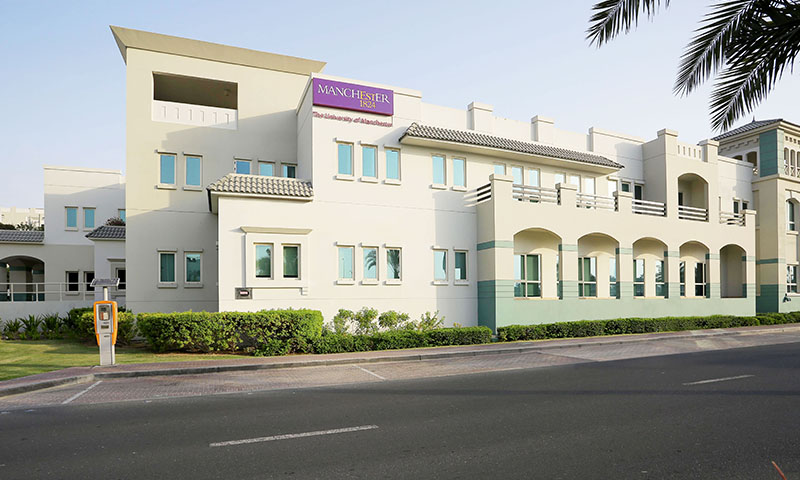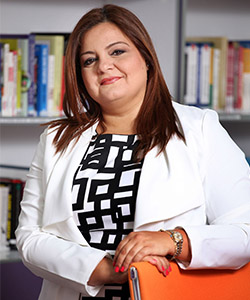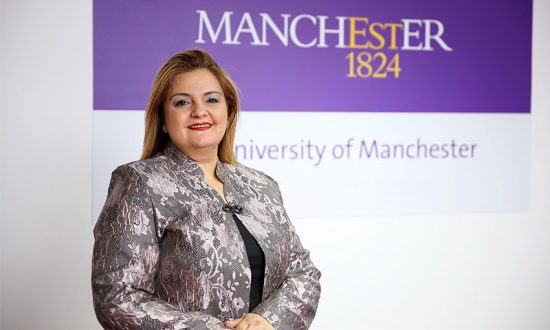Randa Bessiso has spent much of her career working on market entry strategies, company startups and channel development programmes, and building profitable regional businesses and brands. Randa was instrumental in planning and establishing the Middle East Centre, which opened in Dubai in 2006. She is responsible for the overall management, operations, strategic planning and business development of The University of Manchester in the Middle East. Initially, Randa led the successful launch of the Alliance Manchester Business School Middle East Centre. This success was recognised by the wider University, which led to the re-naming of the centre and broadening of its role representing the academic interests of the entire University in the region.
Dubai – and the UAE– has a global profile that helps attract talented individuals to live, work and study in the emirate. The growing number of international universities and institutes in Dubai, coupled with the high standard of living, education and services, will continue to draw students to the country.
In the Middle East and beyond, Dubai and the UAE have set the benchmark not just for the region but for other education centres globally, and the emirate’s higher education sector is continuing to expand and mature. Capacity is increasing due to Dubai’s ability to attract high-quality institutions from around the world, as well as offer a diversified range of programme options and learning formats for students.
Supported by the world’s largest free zone dedicated to higher education, Dubai is attracting global talent and education providers. This growing number of branch campuses of overseas universities is providing more choice to local and regional students at both the undergraduate and postgraduate level. However, this trend is less about programme offerings and more about flexibility, personalisation and delivery formats. The key is to maintain high-quality teaching and learning experiences and to support graduates as they embark on their careers. Dubai is committed to this, and we believe that the higher education sector will continue to flourish not just in terms of student numbers but also in terms of choice and consistent quality.
Dubai has become a global destination that attracts talent from around the world. The Global Talent Competitiveness Index 2019, in which the UAE and Dubai both performed well, shows that cities rather than countries are developing stronger roles as talent hubs and will be crucial to reshaping the global talent landscape. This is because cities have greater flexibility in adapting to new trends and patterns, making them especially attractive for entrepreneurial talent.
We see this very clearly in Dubai. There is no doubt that recent developments in the UAE – including the introduction of new visa regulations – will help make studying in the UAE even more appealing to talented young people. The aim is to encourage these students to remain in the country to work and contribute to the emerging ‘knowledge society’ here. At the institutional level, education providers are being supported in developing their campuses as incubators of entrepreneurship and innovation, and to develop their capabilities as international research centres.
There is no doubt that the regional economy presents unique career opportunities as it undergoes rapid economic diversification and digital transformation. There is an increasing need to align business education programmes with in-demand workplace skills to improve and sustain the employability of students. This vital aspect is being supported by new student visa regulations, improved guidance on securing internships, classifying educational campuses as free zones, focusing on entrepreneurship and incubating innovative startups.
While Dubai is one of the world’s most dynamic cities, and the speed of change and transformation through creativity and innovation creates exciting opportunities, it also presents education providers with the challenge of keeping pace. In higher education particularly, curricula need to be updated to reflect these rapid technological, social and workplace changes.
The internet of things, artificial intelligence and blockchain are all part of the increasing emphasis on technology in education – especially within the business disciplines. While industry relevance is an important component of business programmes, there is no doubt that soft skills, such as leadership and creativity, are also increasingly valued by businesses. These skills are easily transferable across industries and not easily automated.
Different students have different learning preferences, but two key trends in business education are shorter and more intensive programmes, and the ability to personalise the learning experience in terms of programme content and learning format. For example, The University of Manchester offers part-time, blended learning master’s programmes for working professionals and so all our students have the flexibility and convenience of combining online self-study and group studies, along with regular face to face workshops; they also continue to work, earn and with the opportunity to apply their learning immediately. We believe this format offers significant advantages to working professionals who may not have the time or opportunity to undertake a full-time programme but are looking for the same learning and career impact and benefits, beyond a pure online learning experience.
This part-time, blended learning approach has proved to be very effective and popular, as students get as much face to face time as many full-time programmes, through intensive workshops. Full-time study may not be a realistic option for mid-career professionals, and this blended learning approach is the most flexible and manageable option, and still actively encourages collaborative learning and helps students build their networks of professional contacts, which is one of the major benefits of undertaking an MBA. We believe there is also growing interest among some working professionals for pure online business programmes, as the online space matures and technology becomes increasingly immersive and multimedia in nature.
Digital transformation is changing the way people work, live and communicate, and this includes the classroom and business education. As the workplace and work itself changes, so does business education, driven increasingly by the demands of student learners to access learning content in self-study or in collaboration with fellow students, when and how they prefer.

Global virtual classrooms
Fortunately, as many of us have found recently, while there may be no real substitute for eye to eye contact, a handshake, or a hug – whatever is appropriate – the virtual social and learning experience is improving dramatically, thanks to developments in the workplace. From necessity, we have now embarked on a global experiment as more of life, business and education move online, and social distancing becomes a requirement.
Virtualising social contact (friends, family, colleagues, teachers and students) is a new experience for many, but the experiment is likely to leave its mark. We will appreciate even more the value and utility of technology in the absence of direct social contact, but also appreciate even more the irreplaceable value of physical, social contact and interaction.
Learning has always been a social process between students, teachers, schools and parents. Still, for working professionals who are committed to lifelong learning the options have evolved from correspondence courses to distance learning and now the blended learning format that combines online self-study and group-study with face to face workshops with teaching faculty and fellow students. The mix of the blended format may vary (depending on the number of hours of face to face time), but it seems to offer the optimal solution for busy working people who need to juggle family, social, work and study time.
Both elements of the blended mix – online and face to face – are moving in lock-step and converging online with social lives, entertainment, education and work. Distance learning is growing, and the global classroom (open and accessible for learning opportunities everywhere, any time, any device) is becoming more of a reality.
In the Middle East, from our regional centre in Dubai Knowledge Park, we have supported and graduated thousands of part-time master’s students. It’s clear from our experience that students place a very high value on the face to face contact, because it accelerates learning from faculty and peers, and provides the crucial relationship-building and important networking opportunity.
Virtual student workshops can be tailored to regional time zones and designed to provide a faculty-led, content-rich interactive experience to ensure the continuity of learning and maintain individual student progress. We have been using all the experience we have gained over many years of delivering blended learning programmes, which includes online self-study components, across the region.
Business was already ahead of the game. Blended learning is also gaining traction in business education as the corporate world goes deeper into digital business transformation, with technologies such as AI, chatbots, Cloud, blockchain and the Internet of Things being adopted rapidly – business education is increasingly mirroring the workplace.
Employees now commonly work flexibly, remotely, and collaborate and communicate with colleagues and third parties using corporate networks and communications tools, their own devices and apps. Technology really is becoming second-nature as work (and the wider social lives of younger people) is managed online, offline and in a blended format.
With a new generation of digital natives now launching their careers in the workplace, executive learning across all formats and disciplines is increasingly being remixed and going online, as learners look to take the greatest possible control and convenience from the increasing learning and development opportunities open to them. We see this very clearly in Dubai, and a wider region with its young, well-educated and ambitious population of innovative digital natives.
But we are not all digital natives, which makes the current experiment even more challenging and interesting, as it represents a mass learning opportunity for the entire community including across generations, a truly global online learning classroom and workshop for us all – and a glimpse into the future of blended learning.
About Randa Bessiso

Randa has overseen the development of the Middle East team and the launch of a range of educational products, services and initiatives including a careers service, the Manchester Innovation Award for Emiratis, a range of CSR and research projects, and a portfolio of new part-time specialist master’s programmes from the wider University. Among the regional recognitions is the ‘Best MBA Program’ award for the Global Part-time MBA at the inaugural Forbes Middle East Higher Education Awards 2019. On a personal basis, Randa has been recognised annually among the 100 Most Powerful Arab Businesswomen and the Middle East 100 Most Influential Women by Forbes Middle East, from 2014 to 2018. She was also named among the 30 most influential women in the Arab World by Arabian Business, in 2019.
Randa is currently the Chair of the UAE-UK Business Council’s Higher Education Sub Group, and she is a regular media commentator and speaker at executive forums in the UAE and region on her special area of interest – ‘women in business’.




